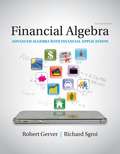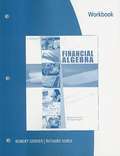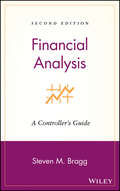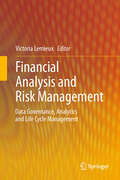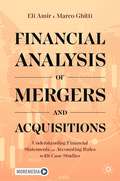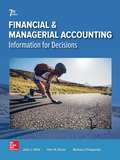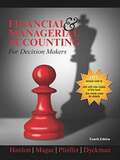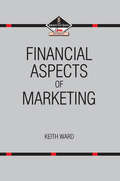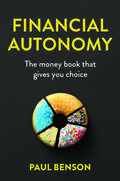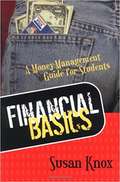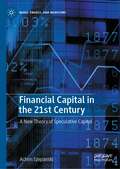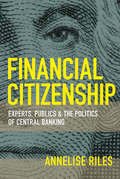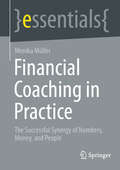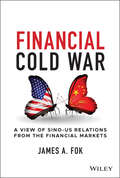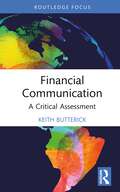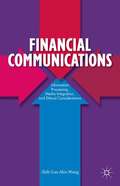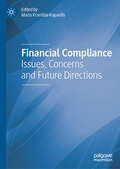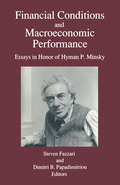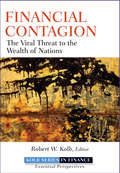- Table View
- List View
Financial Algebra: Advanced Algebra With Financial Applications (Financial Algebra Ser.)
by Robert Gerver Richard SgroiNIMAC-sourced textbook
Financial Algebra: Student Workbook
by Robert K. Gerver Richard J. SgroiThe Student Workbook offers additional resources for mastering algebraic concepts within a financial context.
Financial Analysis
by Steven M. Bragg"The latest edition goes beyond ho-hum analysis techniques and provides concrete problem solving. The text is sprinkled with real-world problems (and the analytical tools to solve them) that will be familiar to accounting professionals everywhere. A must-have for anyone looking to improve their company's decision making . . . and their own role in it."--George R. MacEachern President, Grosvenor Financial Services"Steve Bragg has presented yet another comprehensive reference tool for the finance professional. Financial Analysis: A Controller's Guide is the perfect reference guide for today's controller, presenting not only traditional financial analysis information, but also various types of analyses that will benefit any type of organization. This book is a must-have for any financial professional desiring to make a relevant contribution to his/her organization."--Jodi Nefzger, CPP Director of Finance, Masonic Home of MissouriToday's proactive controllers can soar past their mundane responsibilities and become active participants in their corporation's success with the visionary tools found in Steven Bragg's Financial Analysis: A Controller's Guide, Second Edition.Now updated to include analyses of intangible asset measurement and performance improvement as well as evaluation methods to determine which products and services should be eliminated, Financial Analysis: A Controller's Guide, Second Edition helps financial managers upgrade their skills so they can answer their organization's call for company operations reviews, investment evaluations, problem reporting, and special investigation requests. Controllers prepared to address this growing need for more innovative financial analysis will open doors to a variety of promotions and high-level interactions with other departments.Become a highly valued member of your company's infrastructure with the indispensable tools found in Financial Analysis: A Controller's Guide, Second Edition.
Financial Analysis and Risk Management: Data Governance, Analytics and Life Cycle Management
by Victoria LemieuxThe Global Financial Crisis and the Eurozone crisis that has followed have drawn attention to weaknesses in financial records, information and data. These weaknesses have led to operational risks in financial institutions, flawed bankruptcy and foreclosure proceedings following the Crisis, and inadequacies in financial supervisors' access to records and information for the purposes of a prudential response. Research is needed to identify the practices that will provide the records, information and data needed to support more effective financial analysis and risk management. The unique contribution of this volume is in bringing together researchers in distinct domains that seldom interact to identify theoretical, technological, policy and practical issues related to the management of financial records, information and data. The book will, therefore, appeal to researchers or advanced practitioners in the field of finance and those with an interest in risk management, computer science, cognitive science, sociology, management information systems, information science, and archival science as applied to the financial domain.
Financial Analysis of Mergers and Acquisitions: Understanding Financial Statements and Accounting Rules with Case Studies
by Eli Amir Marco GhittiMergers and acquisitions (M&As) reshape the corporate landscape helping companies expand market share and gain a strategic advantage. The ability to understand and analyze these transactions is a crucial skill. The first step in acquiring that skill is being able to gather and analyse information on M&As from public sources, such as financial statements. This textbook helps its readers better analyze M&A transactions using information provided in financial statements. Covering accounting and reporting of consolidations, goodwill, non-controlling interests, step acquisitions, spin-offs, equity carve-outs, joint ventures, leveraged buyouts, disposal of subsidiaries, special purpose entities, and taxes, it focuses on the link between underlying economic events and the information in financial statements and how this link affects the assessment of corporate performance. The first part of the book provides description of the accounting rules governing M&A transactions, while the second part includes cases of M&A transactions. Each case focuses on a different element of an M&A transaction, and it is followed by a detailed solution with a complete analysis. Unlike other books in this field, this textbook focuses exclusively on accounting and financial analysis for graduate and upper undergraduate level courses in financial analysis, corporate finance, and financial accounting.
Financial Analysis of Real Property Investments
by William J. Poorvu Samuel PlimptonDevelops a conceptual framework for financial analysis of real estate investments, taking into consideration the necessity for baseline data, project trends, and forecast discontinuities.
Financial Analytics with R
by Mark J. Bennett Dirk L. HugenAre you innately curious about dynamically inter-operating financial markets? Since the crisis of 2008, there is a need for professionals with more understanding about statistics and data analysis, who can discuss the various risk metrics, particularly those involving extreme events. By providing a resource for training students and professionals in basic and sophisticated analytics, this book meets that need. It offers both the intuition and basic vocabulary as a step towards the financial, statistical, and algorithmic knowledge required to resolve the industry problems, and it depicts a systematic way of developing analytical programs for finance in the statistical language R. Build a hands-on laboratory and run many simulations. Explore the analytical fringes of investments and risk management. Bennett and Hugen help profit-seeking investors and data science students sharpen their skills in many areas, including time-series, forecasting, portfolio selection, covariance clustering, prediction, and derivative securities.
Financial And Managerial Accounting (Seventh Edition)
by John J. Wild Ken W. Shaw Barbara ChiappettaBuilding on the success of the best-selling Fundamental Accounting Principles text, authors John Wild, Ken W. Shaw, and Barbara Chiappetta created Financial and Managerial Accounting: Information for Decisions to provide a corporate perspective and balanced coverage in this growing course area. With its step-by-step approach, FinMan streamlines complex accounting processes and helps students build confidence by mastering key concepts and procedures. Chapter opening vignettes using dynamic entrepreneurs appeal to all students and show the relevance of accounting. Students are encouraged to think like a businessperson and apply what they learn. A wide variety of assignments provide instructors with materials to teach, assess, and challenge students on several levels. Join your colleagues and the students that have used this best-selling learning system to advance their education and careers.
Financial And Managerial Accounting For Decision Makers
by Michelle Hanlon Robert Magee Glenn Pfeiffer Thomas DyckmanFinancial and Managerial Accounting for Decision Makers
Financial Aspects in Energy
by André Dorsman Mehmet Baha Karan Özgür Arslan Wim WestermanEnergy production and supply, as well as sourcing and consumption, are becoming evermore important in a volatile world. In this book, attention is paid to prevalent energy issues from a finance perspective. The topics discussed cover markets, prices, regulations and firms. An international group of authors from both academia and energy practice provides in twelve chapters a state of the art of the energy markets in a finance environment. They do so by discussing the current knowledge and presenting empirical research in this quickly changing and developing field. This book is the first in a planned series on energy at a high scientific level organized by the Centre for Energy and Value Issues (CEVI).
Financial Aspects of Marketing
by Keith WardFirst published in 1989. Financial Aspects of Marketing is designed particularly for students taking the Part 2 Certificate paper in Financial and Management Accounting of the Chartered Institute of Marketing. The increased emphasis on marketing issues of the new paper and the use of financial information as an aid to decision making provide students with the ability to be 'financially literate'. Practical applications of financial concepts and techniques and their relevance to the marketing function are demonstrated. Contents include Introduction and overview: Analysis -establishing the starting point; Planning - setting objectives and strategies: Control - monitoring achievements: Applications and examples.
Financial Assets, Debt and Liquidity Crises: A Keynesian Approach
by Peter Flaschel Matthieu Charpe Carl Chiarella Willi SemmlerThe macroeconomic development of most major industrial economies is characterised by boom-bust cycles. Normally such boom-bust cycles are driven by specific sectors of the economy. In the financial meltdown of the years 2007-2009 it was the credit sector and the real-estate sector that were the main driving forces. This book takes on the challenge of interpreting and modelling this meltdown. In doing so it revives the traditional Keynesian approach to the financial-real economy interaction and the business cycle, extending it in several important ways. In particular, it adopts the Keynesian view of a hierarchy of markets and introduces a detailed financial sector into the traditional Keynesian framework. The approach of the book goes beyond the currently dominant paradigm based on the representative agent, market clearing and rational economic agents. Instead it proposes an economy populated with heterogeneous, rationally bounded agents attempting to cope with disequilibria in various markets.
Financial Autonomy: The money book that gives you choice
by Paul BensonFinancial Autonomy is a fresh, innovative book about money. But unlike most money books, it's not focused on making you the richest person in your street, or worse, the richest person in the cemetery. Instead, the focus of this book is on gaining choice. What can you do on the money side of your life, to provide you with the choice to pursue maximum happiness in all the other aspects of your life.Have you ever listened to a guest on a radio program or a speaker at an event talking about some amazing experience they've had? Perhaps it was traveling through Tibet in a beaten-up Land Rover, sailing around the world, jumping out of planes in a wing suit, or starting a business or charity of their own, driven by a magnitude 10 passion to make an impact.And when listening to these inspiring stories, have you ever wondered how they managed to organise their life so that it was possible? Do you wish you could organise your life to do what's important to you?Financial Autonomy is a book about money but it's equally about gaining choice. If you get the money side of your life right, you will have the choice to pursue maximum happiness in all the other aspects of your life. Personal finance expert Paul Benson believes there are three vehicles to create enough wealth to have the choices you desire are: (1) Investing in shares; (2) Investing in property; and (3) Working for yourself (starting a side hustle or small business). He explores these in detail, as well budgeting and saving - and as you'd expect, he gives readers a choice of strategies they can adopt to succeed in these areas.
Financial Basics: A Money-Management Guide for Students
by Susan Knox<p>Jason is typical of today's college students, who are assuming unprecedented debt burdens because of relaxed limits on student loans and easily obtained credit cards. Many on college campuses are calling it a fiscal crisis. <p><i>Financial Basics</i> tackles the gaps in the personal financial knowledge of college students. Beginning with debit-credit card issues, student loan decisions, and the challenge of managing and reducing debt, Knox walks readers through money management. She skillfully addresses the how-to's of checking accounts, spending plans, emergency funds, and credit histories. She discusses financial personalities and the emotions of money, as well as practical record-keeping and simple filing techniques. <p>In <i>Financial Basics</i>, Knox blends her extensive money-management experience with her desire to inform and help students master their finances: she shares experiences about money lessons learned in college, and offers sound solutions and advice for students and their families. Since everyone does not handle money in the same way, Knox gives money-management options for readers to find their best way. The book includes helpful worksheets and is written in an easy-to-read style, using testimonials and examples that will ring true to students.</p>
Financial Calculus
by Martin Baxter Andrew RennieFinance provides a dramatic example of the successful application of advanced mathematical techniques to the practical problem of pricing financial derivatives. This self-contained 2002 text is designed for first courses in financial calculus aimed at students with a good background in mathematics. Key concepts such as martingales and change of measure are introduced in the discrete time framework, allowing an accessible account of Brownian motion and stochastic calculus: proofs in the continuous-time world follow naturally. The Black-Scholes pricing formula is first derived in the simplest financial context. The second half of the book is then devoted to increasing the financial sophistication of the models and instruments. The final chapter introduces more advanced topics including stock price models with jumps, and stochastic volatility. A valuable feature is the large number of exercises and examples, designed to test technique and illustrate how the methods and concepts can be applied to realistic financial questions.
Financial Capital in the 21st Century: A New Theory of Speculative Capital (Marx, Engels, and Marxisms)
by Achim SzepanskiThe book’s central theme is to develop a new theory of speculative capital related to other forms of capital, the world market, and the state. Unlike most Marxist and heterodox theories, the book distinguishes credit and fictitious capital from speculative capital to show its hegemony today in the capital markets. Speculative capital structures and also controls the so-called “real capital.” The method is Marxist while also incorporating material from contemporary Marxist and heterodox authors like John Milios, Robert Meister, Tony Norfeld, Li Puma, Harald Strauß, Michael Heinrich, Suhail Malik, Bichler/Nitzan and Ellie Ayache. Offering a comprehensive study of the logic and mode of existence of capital in the 21st century, the book will be of interest to academics and students of monetary and financial economics alongside political economy.
Financial Centres In Europe
by Rym Ayadi Emrah ArbakAssesses to what extent increased international cooperation could help selected financial centres in Europe respond to the future risks and opportunities facing them. The book identifies challenges that the jurisdictions face in coming years by means of representative samples and systematic comparisons of financial centres.
Financial Citizenship: Experts, Publics, and the Politics of Central Banking
by Annelise RilesGovernment bailouts; negative interest rates and markets that do not behave as economic models tell us they should; new populist and nationalist movements that target central banks and central bankers as a source of popular malaise; new regional organizations and geopolitical alignments laying claim to authority over the global economy; households, consumers, and workers facing increasingly intolerable levels of inequality: These dramatic conditions seem to cry out for new ways of understanding the purposes, roles, and challenges of central banks and financial governance more generally. Financial Citizenship reveals that the conflicts about who gets to decide how central banks do all these things, and about whether central banks are acting in everyone’s interest when they do them, are in large part the product of a culture clash between experts and the various global publics that have a stake in what central banks do.Experts—central bankers, regulators, market insiders, and their academic supporters—are a special community, a cultural group apart from many of the communities that make up the public at large. When the gulf between the culture of those who govern and the cultures of the governed becomes unmanageable, the result is a legitimacy crisis. This book is a call to action for all of us—experts and publics alike—to address this legitimacy crisis head on, for our economies and our democracies.
Financial Coaching in Practice: The Successful Synergy of Numbers, Money, and People (essentials)
by Monika MüllerThis essential provides a comprehensive introduction to the definition and significance of financial coaching. You will get an overview of international research in this field and learn about the crucial role psychology plays in financial decisions. The author presents the latest research findings that clarify whether intellect, intuition, or emotion are decisive for good decisions. Financial coaching begins with diagnostics, which includes measuring risk tolerance as well as biographical work on the individual psychodynamic effects of money projections. The reader learns how coaching helps to shed unfavorable decision patterns and successfully implement new ones. Practical insights into the profession of financial coaching and the underlying core competencies round off the book. You will expand your understanding of financial coaching and can use the insights from this book for your own success.
Financial Cold War: A View of Sino-US Relations from the Financial Markets
by James A. FokA groundbreaking exploration of US-China relations as seen through the lens of international finance Rising tensions between China and the United States have kept the financial markets on edge as a showdown between the world’s two largest economies seems inevitable. But what most people fail to recognise is the major impact that the financial markets themselves have had on the creation and acceleration of the conflict. In Financial Cold War: A View of Sino-US Relations from the Financial Markets, market structure and geopolitical finance expert James Fok explores the nuances of China-US relations from the perspective of the financial markets. The book helps readers understand how imbalances in the structure of global financial markets have singularly contributed to frictions between the two countries. In this book, readers will find: A comprehensive examination of the development of financial markets in both China and the US, as well as the current US dollar-based global financial system Insightful observations of the roles of technology, innovation, regulation, taxation, and politics in the markets, and on their resulting effect on US-Sino relations Thorough explorations of the role of Hong Kong as an intermediary for capital flows between China and the rest of the world Suggestions for how, balancing the many varying interests, policymakers might be able to devise effective strategies for de-escalating current Sino-US tensions Financial Cold War is a can’t-miss resource for anyone personally or professionally interested in the intersection of economics and international relations, financial markets, and the infrastructure underlying the international financial system.
Financial Communication: A Critical Assessment (Routledge New Directions in PR & Communication Research)
by Keith ButterickThis essential guide to financial communication provides a concise critical overview of this increasingly important field. It challenges existing assumptions about the role and significance of financial public relations (PR) and investor relations, and the dominant paradigm of shareholder value. This book explores how the dominant paradigm in financial PR is based on the methodologically and historically incorrect assumption of symmetrical communication.Highlighting the importance of financial communications in the corporate hierarchy where it is often a direct function of the Finance Director, this book critically assesses its ideological role in normalising the idea and role of ‘the market’ and promotes the neoliberal view that the sole function of the public company is to increase shareholder value. It opens up new theoretical perspectives by considering retail investor behaviour from the perspective of fandom theory through the behaviour of investors during financial booms, busts and bubbles.This volume will be of interest to researchers in the fields of PR, financial communication, accounting and financial management as well as practitioners working in financial PR and investor relations.
Financial Communications
by Shih-lun Alex WangFinancial Communications showcases why it is crucial for financial institutions to enhance key communication processes, rebuild trust with its customer base, improve relationships, and derive better brand awareness amongst key stakeholders within the industry.
Financial Compliance: Issues, Concerns and Future Directions
by Maria Krambia-KapardisThis book explores the fundamental elements and risks that impact the compliance officer’s work. Following a comprehensive understanding of the role of a compliance officer, by engaging with themes of compliance officers’ liability, expectations, risks and effectiveness, it provides practical answers by leading academics and practitioners in the field. This work also draws on how other areas, such as GDPR, financial regulation and whistleblowing, challenges on compliance officers and provides a way forward to convert these challenges into opportunities. The discussion of compliance challenges and practices in Australia, Europe and the United States provides critical insights into the development of compliance in today’s financial environment. Financial Compliance: Issues, Concerns and Future Directions provides an invaluable working resource for academics, practitioners and a general audience interested in understanding and developing an effective compliance culture.
Financial Conditions and Macroeconomic Performance: Essays in Honor of Hyman P.Minsky
by Steven M. Fazzari Dimitri B. PapadimitriouThis collection of papers on financial instability and its impact on macroeconomic performance honours Hyman P. Minsky and his lifelong work. It is based on a conference at Washington University, St. Louis, in 1990 and includes among the authors Benjamin M. Friedman, Charles P. Kindleberger, Jan Kregel and Steven Fazzari. These papers consider Minsky's definitive analysis that yields such a clear and disturbing sequence of financial events: booms, government intervention to prevent debt contraction and new booms that cause a progressive buildup of new debt, eventually leaving the economy much more fragile financially.
Financial Contagion: The Viral Threat to the Wealth of Nations (Robert W. Kolb Series #604)
by Robert W. Kolb"Financial Contagion: The Viral Threat to the Wealth of Nations covers a lot of territory. It is, of course, terribly important to analyze case histories to discover potential triggers, mechanisms of transmission, and viable ways to contain the damage of financial contagion. The problem is, as these articles amply demonstrate, that there’s always a new virus or a mutation of a former one lurking in some corner of the financial world. We don’t know what it is or where it is. And, even if we had some inkling, there’s almost never enough time to develop a financial flu shot." --SeekingAlpha.com The latest insights on financial contagion and how both nations and investors can effectively deal with it. The domino-style structure in which the financial system exists is a perilous one. Although historically, the financial system has been able to deal with major shocks, the fact remains that our financial system is not as secure as it should be. Recent years have brought about too many examples of contagion and systemic risk. That is why Financial Contagion is such an important read. In it, the serious concerns that revolve around our fragile economic system are investigated, researched, and explained. Throughout the book, Kolb offers valuable insights on this dilemma as he compiles the history of financial contagion, highlights the latest research on systemic failure and interrelated markets, and analyzes the risks and consequences we face moving forward. Examines the importance of careful regulation and what must be done to stabilize the global financial system Includes contributed chapters from both academics and experienced professionals, offering a variety of perspectives and a rich interplay of ideas Details how close we are to witnessing a financial contagion that could devastate the world economy We have been harshly reminded of how fragile our economic ecosystem is. With Financial Contagion, you'll hold a better understanding of what needs to be done to strengthen our system and safeguard our financial future.
